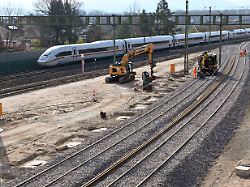“Would change something quickly”
Monopolies Commission advises breaking up the railway
4/23/2023, 5:59 p.m
After the Federal Audit Office and the Union had already called for a radical realignment of Deutsche Bahn, the Monopolies Commission is now also calling for the state-owned company to be split up. The infrastructure and transport divisions belonged separately. In Spain, rail users have already clearly benefited from this.
Nationwide strikes, an ailing and disruption-prone route network, delays, billions in debt, a major project with the Deutschlandtakt that was recently postponed 40 years into the future: “The railway infrastructure is in a critical condition and cannot meet the demands for quality and capacity” , said CEO Richard Lutz at the presentation of the business figures for 2022 in March. The state-owned company is clearly in crisis, but the railway is said to be a key building block against the climate crisis. In the current situation, the Monopolies Commission, which advises the federal government on competition issues, is calling for Deutsche Bahn to be split up.
“According to the Monopolies Commission, the advantages of a complete separation of infrastructure and transport divisions outweigh the disadvantages. The goal should be to separate the operators of the infrastructure and the users of this infrastructure from each other,” says the commission chairman, Jürgen Kühling, of the “Süddeutsche Zeitung”. Kühling is a law professor and teaches at the University of Regensburg.
According to the Monopolies Commission, there should in future be a company that organizes the actual train traffic and another independent company should take care of the 33,000-kilometer rail network. “In the end we will have a company that is only interested in the network being well utilized and working well. Then there will no longer be any incentive to impede competitors on the network.” And: “In our opinion, this would change something fairly quickly for customers, other rail providers and for investments in the network.” In Spain, the separation has improved competition and ticket prices have fallen.
Traffic lights do only half a step for train plans
Both the Union and the Federal Court of Auditors are calling for it to be broken up. Kühling does not want to comment specifically on the accusation that this is a diversionary maneuver by the Union, which for a very long time provided the Federal Minister of Transport and could have pushed ahead with a reform, he only says: “We are only evaluating the proposals themselves, and this proposal is good . But the discussion has been smoldering for a long time.”
The traffic light government is planning to introduce a “public welfare-oriented infrastructure company” within the railway from 2024. This should prevent investments that are intended for the expansion of the railways from being able to migrate to other areas. “That’s a step in the right direction, but only half a step,” says Kühling. He is confident that the idea of breaking up will prevail: “We like to drill through thick boards, I’m an optimist, clever suggestions will eventually prevail.”
